Arundhati Roy: ‘The Damage to Indian Democracy Is Not Reversible’
BRICS, 4 Jul 2022
Arundhati Roy interviewed by CNN - TRANSCEND Media Service
22 Jun 2022 – When two spokespeople from India’s ruling Hindu nationalist Bharatiya Janata Party (BJP) made derogatory comments about the Prophet Mohammed last month, it prompted an international firestorm.
The incident led to protests among India’s Muslim minority in several states. Some Muslim-majority nations summoned their India ambassadors. India’s foreign ministry said the comments did not reflect the views of the government, and the officials involved — one of whom later withdrew her remarks — faced disciplinary action.
But for India’s 200 million Muslims, these comments were not an isolated incident.
Rather, they were the culmination of the BJP’s “engineering hatred of a common enemy,” says bestselling Indian author Arundhati Roy.
“India’s tragedy is not that it’s the worst place in the world — it’s that we are on our way there. We’re burning down our house. India is an experiment that is failing dangerously,” she told CNN.
“Many, many of my beloved friends — poets, writers, professors, lawyers, human rights activists and journalists — are in prison, most of them charged under a dreaded law called the Unlawful Activities Prevention Act, all of them for speaking up for minorities, Dalits and forest-dwellers facing displacement and state terror.
“Among them are people I consider to be India’s most important minds. It makes one wonder what living as a free person in the time of fascism means. What does it mean to be a bestselling author when the world is breaking?” writes Roy.
In this email interview, Roy says Indian politics has something in common with the US Capitol riots, that Prime Minister Narendra Modi is stoking hatred, and talks about who the real power in India lies with.
**********************
CNN: What does this incident involving BJP officials’ comments about the Prophet Mohammed reveal about Indian politics today?
Roy: It reveals how successfully the clear and present existential threat posed by Hindu nationalism in India has been masked by the face it presents to the outside world. You know the people in strange clothes, the man in furs and antlers who stormed the US Capitol? We’re being ruled by their equivalent here. The difference is that they are not a collection of random lunatics. They are members of the most powerful organization in India — the RSS (Rashtriya Swayamsevak Sangh), whose founding ideologues openly admired Hitler and likened the Muslims of India to the Jews of Germany. RSS is the real power in India.
CNN: What is the connection between the BJP and RSS?
Roy: The ruling party, the BJP (Bharatiya Janata Party), considered to be one of the richest political parties in the world, is only the front office of the RSS. Founded in 1925, the RSS, traditionally controlled by a handful of Brahmins, now has millions of members including Prime Minister Narendra Modi, who has been a member since his teenage years, and most of his cabinet ministers.
It has its own vast militia, its own schools, labor unions and women’s organizations. It’s not a political party, it’s something of a shape-shifter, a master of double-speak, its sources of funding are amorphous and leave no legal trail, it works through an array of affiliates, but it’s a nation within a nation.
The RSS believes that India should be declared a Hindu nation, just as Pakistan, Iran and several countries in the Persian Gulf are Islamic nations, just as Israel is legally the “nation-state of the Jewish people.”
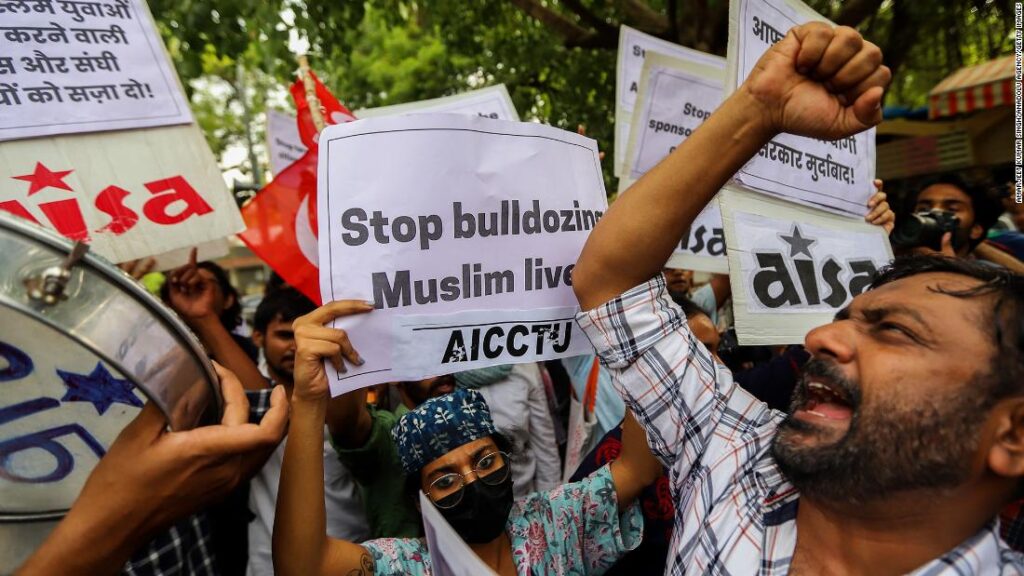
A demonstration against the state government demolition of the house of a local Muslim leader in Prayagraj on June 13. The demolition followed clashes after controversial remarks made by two BJP officials about the Prophet Mohammed. CNN
In fact, the RSS believes in what it calls “Akhand Bharat,” a sort of fantasy that is futuristic and ancient all at once — a future Ancient India which includes Pakistan and Bangladesh which will be conquered and subject to Hindu rule. To flatten India’s mind-boggling religious, socialand subnational identities, more diverse than all of Europe, into the strict hierarchy of a moribund, caste-bound Hindu nation is an unimaginably violent process. It means setting aside the constitution and undoing the very idea of India.
First in the line of fire is the Muslim community. Close behind are Christians — a tiny minority that is also being brutalized. Last year alone there were more than 400 attacks on Christians. Churches have been vandalized, priests and nuns beaten up, their congregations threatened and humiliated.
In the last two national elections, in 2014 and 2019, the BJP has shown that it can win a solid majority in the national parliament without the votes of India’s 200-million-strong Muslim community. That has effectively resulted in a sort of disenfranchisement and political isolation of Muslims, which is extremely dangerous.
There is also a new anti-Muslim citizenship law, a sort of refugee-manufacturing policy in which those who cannot produce a mandated set of “legacy papers,” which few people have, can find themselves deprived of citizenship. Nearly 2 million people in the state of Assam have already been struck off the National Register of Citizens. Massive detention centers for those who have been stripped of citizenship are being constructed all over the country.
But isolating Muslims is not enough. Creating an artificial majority out of a very diverse Hindu community that consists of thousands of castes and ethnicities is equally important if the BJP is to remain in power. The cement for that is engineering hatred of a common enemy. This requires an incremental ratcheting up of bigotry.
Apart from the mass killings and lynching of Muslims by Hindu vigilantes in recent years, we have the steady drumbeat of hatred and outlandish disinformation beamed into peoples’ homes by approximately 400 TV channels and countless newspapers. On social media handles viewed by millions of people there are open calls for the genocide of Muslims — and videos demonstrating how it should be done.
We regularly see provocative demonstrations by thousands of sword-wielding Hindu men marching through areas in which Muslims live. The deeply disrespectful comments about Prophet Mohammed made by a BJP spokeswoman on national TV this May was a part of this constituency-building exercise. As was the unconscionable bulldozing by municipal authorities of the homes of Muslims who dared to come out in protest.
To flatten India’s mind-boggling religious, social, and subnational identities… into the strict hierarchy of a moribund, caste-bound Hindu nation is an unimaginably violent process. — Arundhati Roy
Some of the protestors publicly called for beheadings and hanging and asking for a blasphemy law which the BJP would probably be more than happy to pass and use to silence its critics in swifter and more deadly ways. These individuals helped to confirm every deeply held prejudice about Muslims that the Hindu Right works so hard to perpetuate.
As a concession to international outrage, the BJP has suspended its spokeswoman, Nupur Sharma, but she has been openly embraced by its cadre. The polarization has worked in the BJP’s favor.
CNN: And what does Prime Minister Narendra Modi have to do with it?
Roy: Modi has made no comment whatsoever about the spokeswoman or the protests. A standard tactic of his. In situations like this, his followers, correctly I believe, read his silence as support. Although he increasingly positions himself as a messiah, he is an RSS man, and he knows that the organization is grooming other leaders who are waiting in the wings. But for now, he is the uncontested figurehead.
Modi made his political debut in October 2001. He was appointed, not elected, chief minister of the state of Gujarat. It was just weeks after the 9/11 attacks in the United States. The world was convulsed by Islamophobia. It was the perfect political climate for the RSS.
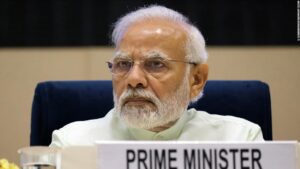
India’s Prime Minister, Narendra Modi, pictured here on June 6, has not publicly commented on the recent BJP officials’ comments about the Prophet Mohammed.
T. Narayan/Bloomberg via Getty Images
A few months later, in February 2002, following an act of arson in which a railway carriage carrying Hindu pilgrims was burnt, there was a brutal pogrom against Muslims in the villages and towns of Gujarat. It lasted for weeks. While the police watched, more than a thousand people were slaughtered in broad daylight, women were gang-raped and burnt alive, and tens of thousands were displaced from their homes. Subsequently the murderers were caught on camera boasting of their deeds. Many spoke of how they were inspired and protected by Modi.
Modi was unapologetic and came to be known as “Hindu Hriday Samrat” — the Emperor of Hindu Hearts. Soon after the 2002 massacre, he called for state elections and won with a massive majority. He has never looked back since — he was elected Chief Minister of Gujarat for three terms and in 2014 was elected prime minister. And we in India have begun to look at massacres and hatefulness against Muslims as an integral part of election campaigns. During Modi’s tenure as Gujarat Chief Minster, Hitler made it into a school textbook published by the Gujarat State Board of School Textbooks as an inspirational leader.
CNN: Over the years, Modi’s popularity and his brand of politics has not waned. Why is that?
Roy: For the same reasons that studies of the algorithms of Facebook and Twitter show that hatefulness gets far more traction than decency. Miserable people, oppressed people, unemployed people, people living in crushing poverty are voting themselves into further hellishness, their sunken eyes fixed on the object of their hate.
After Modi’s shocking display of callous incompetence during the pandemic — the sudden lockdown in the first wave that led to millions of stranded workers many of who had to walk thousands of miles home to their villages, the millions of deaths in the second wave — some still shake their heads in sorrowful awe and say, “Without Modi, it would have been worse.”
They’ve swallowed the story they’ve been fed about themselves, about their own lives. Meanwhile Modi has zero accountability. He has never addressed a single press conference in all his years as prime minister. All we get are staged performances and photo ops.
CNN: What has contributed to this situation where the Modi government feels immune from any international reaction or action?
Roy: I don’t think it is immune at all. On the contrary, our globe-trotting, head-of-state-hugging prime minister cares deeply about international opinion. None of us have ever seen him hug a fellow Indian. The optics of his foreign trips are carefully curated. His millions of followers refer to him as “Vishwa-Guru,” the Guru of the Whole World.
Barack Obama, Donald Trump, Angela Merkel, Emmanuel Macron, Boris Johnson have all indulged him. International action and reaction is only a game of pragmatism and expediency. It has to do with trade and geopolitics, race, religion and ethnicity, and very little with values and morality.
If India is buying a fleet of fighter planes from, say, France, it knows that lynching and a little mass murder will, at most, get a delicate finger-wag. A big market is excellent insurance against moral censure.
Right now, foreign relations are a little tricky for India because of the Ukraine war and India’s proximity to Russia. So, India’s crimes in Kashmir and this very violent form of Hindu nationalism is coming under a little scrutiny. But these are all just bargaining chips in the Great Game. Sorry to sound so cynical, but I am.
CNN: How should India’s international Muslim trading partners respond? (And the world, for that matter?)
Roy: Most of the countries that you refer to as India’s “Muslim trading partners” have long ago given up any pretense of democracy or diversity. They are already at the destination that Modi and the BJP are trying to drag India toward. The destination that we dread to arrive at, the theocratic state.
India’s tragedy is not that it’s the worst place in the world — it’s that we are on our way there. We’re burning down our house. India is an experiment that is failing dangerously. Failing because our elected leaders are blinded by hate — and crippled by a severe lack of intelligence, which is the more dangerous thing. The consequences will be unimaginable.
As for what the rest of the world can do, all one can hope for is that people pay attention and form an informed opinion. And realize that their profits from this immense “market” will dry up if the market ceases to exist. The Indian economy is in a lot of trouble. Wealthy people, businesses big and small, have begun to flee. They are good and accurate weather vanes.
CNN: Is India truly the world’s largest democracy?
Roy: A democracy doesn’t just mean having regular elections. You cannot be a democracy when 200 million people who constitute a religious minority are expected to live without rights. When you can lynch them, kill them, incarcerate them, economically and socially boycott them, bulldoze their homes with complete immunity and threaten to strip them of citizenship. When the murderers and lynchers can aspire to move swiftly up the political ladder.
CNN: The damage done to Indian democracy — is it reversible?
Roy: The systematic indoctrination of people on the scale on which it has taken place over decades is hard to reverse. Every institution that is supposed to make up the system of checks and balances has been hollowed out, repurposed and deployed against people as a weapon of Hindu nationalism. In terms of political opposition, there are political parties that have successfully opposed the BJP at the state level in Tamil Nadu, Bengal, Kerala, Maharashtra, Punjab, but opposition is virtually non-existent at the national level.
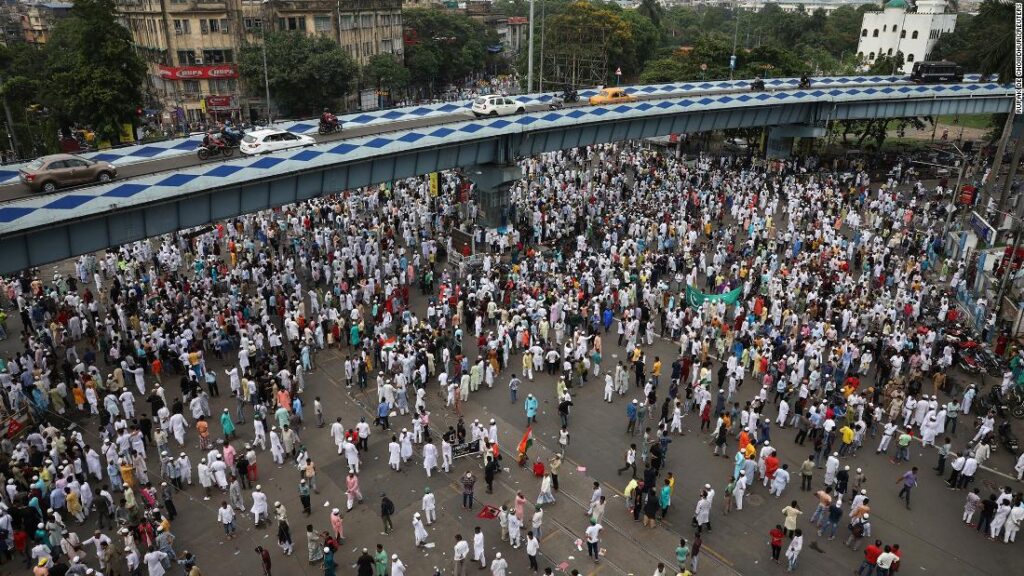
Muslim demonstrators at a protest demanding the arrest of Bharatiya Janata Party (BJP) official Nupur Sharma following her comments about the Prophet Mohammed, in Kolkata on June 10. REUTERS/Rupak De Chowdhuri
The whole system of elections has been gamed. You can win a huge majority of seats even without anything close to a majority of actual votes. In India, we have a first-past-the-post, multi-party democracy. This means that even if you get say only 20% of the vote in a constituency, as long as its higher than your closest rival, you win. A rich party can put up spurious candidates to split the votes. But that’s just one trick in a whole bag of tricks.
And, anyway, how do you woo an indoctrinated population? By proving that you are a better, prouder Hindu? Nobody can beat the BJP at that game. And right now, that’s the only game in town. As far as mainstream politics goes.
So, no, I don’t believe the damage is reversible. I believe we will be broken and then reborn. Change will only come when and if at all an accepting, gullible, fatalistic people realize what’s being done to them. And then it will come suddenly, and from the street. Not from the system. Until then… God help us.
CNN: What changes have you personally experienced that echo the changes taking place in India at large?
Roy: To begin with, many, many of my beloved friends — poets, writers, professors, lawyers, human rights activists and journalists — are in prison. Among them are people I consider to be India’s most important minds. It makes one wonder what living as a free person in the time of fascism means.
What does it mean to be a bestselling author when the world is breaking? What does it mean to be considered a ‘success’ when the world is failing and everything you care about is being decimated? What is the moral way to be? The moral thing to do?
I am one of those unfortunate people who saw this coming decades ago. I said so. I wrote so. At the time that made me something of a crazy outlier — one of those people who sets off a fire alarm right when the party’s going really well and everyone’s happy. In some ways it un-homed (not un-housed) me in all sorts of ways, literally and metaphorically — which is not a bad thing for a writer, actually.
What does it mean to be a bestselling author when the world is breaking? — Arundhati Roy
The idea of patriotism has been fused with the idea of Hindu nationalism, so people like myself are on the A-list of “anti-nationals.” Of course it helps their cause that I am not Hindu. My mother who raised me is Christian. My estranged father who I never really knew came from a Hindu family and converted to Christianity as did his father and his father’s father. But this doesn’t enrage them as much as the things I write and say. Particularly about Kashmir. A Bollywood actor and BJP member of parliament suggested that I be tied to an army jeep and used as a human shield by the Indian Army in Kashmir. They really should try that.
Sadly, the BJP’s macro-radicalization has resulted in micro-versions of the same thing. It is mirrored by its allies, its doorkeepers, concierges and maintenance staff, as well as its victims. As everybody turns inward, bitter and doctrinaire, as every form of solidarity crumbles, as the garbage mountains grow and the rivers shrink, as stock characters locked into their own little ideological bubbles shout at each other on TV, I feel my own skin tightening around me, containing me, too. I struggle against that every day. The only home one has is in literature and poetry. That sentence that makes you gasp — or smile out loud. The song that breaks your heart.
CNN: What kind of India would you like to see — and how do we get there?
Roy: My dreams are not, and never have been, limited by the shape of the map of India, or any country. They’ve always been either much smaller or much bigger. The dream worth dreaming is to see our world moving toward a shared understanding of justice, however slowly, instead of racing away from it at the pace we are.
_______________________________________________
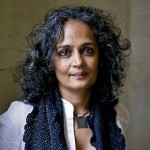 Arundhati Roy, born Nov 24 1961, is an Indian novelist and political activist. She studied architecture in New Delhi, where she now lives. She is the author of the novels The God of Small Things, for which she received the 1997 Booker Prize, and The Ministry of Utmost Happiness. A collection of her essays from the past twenty years, My Seditious Heart, was recently published by Haymarket Books. Roy was awarded the Sydney Peace Prize in 2004 and has concentrated on penning down political issues being a critic of neo-imperialism and linked to anti-globalization movements. Roy’s subversive nature has made her accustomed to criticism. “Each time I step out, I hear the snicker-snack of knives being sharpened but that’s good. It keeps me sharp”, she said when interviewed by an Indian magazine.
Arundhati Roy, born Nov 24 1961, is an Indian novelist and political activist. She studied architecture in New Delhi, where she now lives. She is the author of the novels The God of Small Things, for which she received the 1997 Booker Prize, and The Ministry of Utmost Happiness. A collection of her essays from the past twenty years, My Seditious Heart, was recently published by Haymarket Books. Roy was awarded the Sydney Peace Prize in 2004 and has concentrated on penning down political issues being a critic of neo-imperialism and linked to anti-globalization movements. Roy’s subversive nature has made her accustomed to criticism. “Each time I step out, I hear the snicker-snack of knives being sharpened but that’s good. It keeps me sharp”, she said when interviewed by an Indian magazine.
Tags: Arundhati Roy, Hindus, India, Muslims, Narendra Modi, Racism, Religious Freedom
DISCLAIMER: The statements, views and opinions expressed in pieces republished here are solely those of the authors and do not necessarily represent those of TMS. In accordance with title 17 U.S.C. section 107, this material is distributed without profit to those who have expressed a prior interest in receiving the included information for research and educational purposes. TMS has no affiliation whatsoever with the originator of this article nor is TMS endorsed or sponsored by the originator. “GO TO ORIGINAL” links are provided as a convenience to our readers and allow for verification of authenticity. However, as originating pages are often updated by their originating host sites, the versions posted may not match the versions our readers view when clicking the “GO TO ORIGINAL” links. This site contains copyrighted material the use of which has not always been specifically authorized by the copyright owner. We are making such material available in our efforts to advance understanding of environmental, political, human rights, economic, democracy, scientific, and social justice issues, etc. We believe this constitutes a ‘fair use’ of any such copyrighted material as provided for in section 107 of the US Copyright Law. In accordance with Title 17 U.S.C. Section 107, the material on this site is distributed without profit to those who have expressed a prior interest in receiving the included information for research and educational purposes. For more information go to: http://www.law.cornell.edu/uscode/17/107.shtml. If you wish to use copyrighted material from this site for purposes of your own that go beyond ‘fair use’, you must obtain permission from the copyright owner.
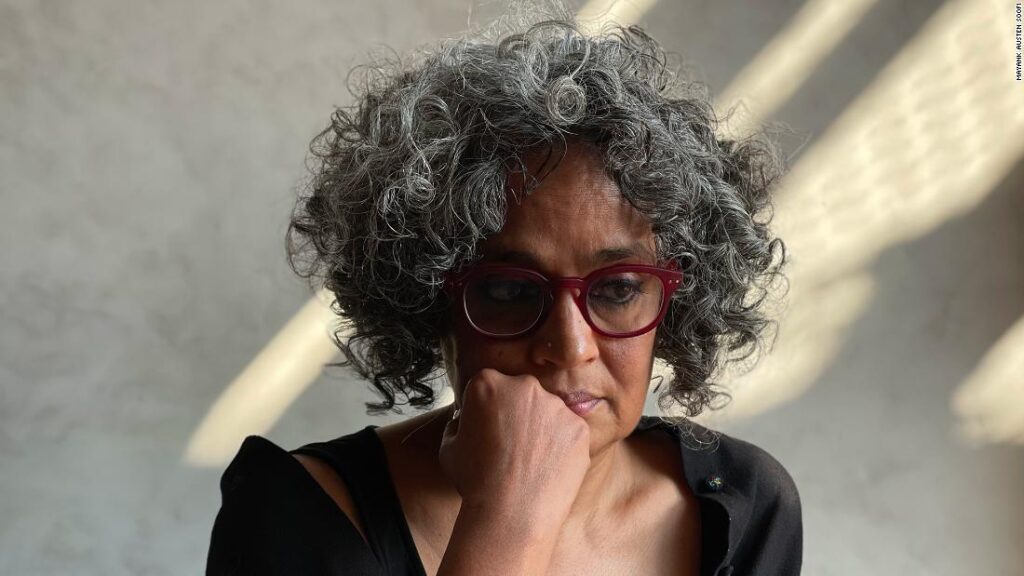
Dear Arundhati, despite all the terrible events we see or support or participate in, is able to inspire people to do their best to change things for the better, however difficult that is.